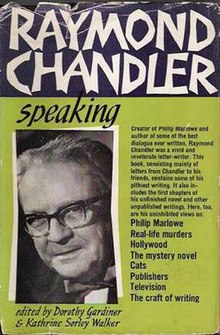Raymond Chandler Speaking
Appearance
 First edition (UK) | |
| Author | Raymond Chandler; edited by Dorothy Gardiner and Kathrine Sorley Walker |
|---|---|
| Language | English |
| Genre | Literary criticism |
| Publisher | Hamish Hamilton (UK) Houghton Mifflin (US) |
Publication date | 1962 |
| Publication place | United States |
| Media type | |
| Pages | 272 |
| OCLC | 35192346 |
| 813/.52 B 20 | |
| LC Class | PS3505.H3224 Z47 1997 |
Raymond Chandler Speaking is a collection of letter excerpts, various notes, essays and an unfinished novel. It was compiled in 1962 by Dorothy Gardiner and Kathrine Sorley Walker.[1] The origins of the collection were contentions: after Chandler's death, his literary agent and lover Helga Greene and his private secretary Jean Fracasse entered into a legal battle over his estate which Greene won.[2]
Contents
Apart from excerpts from letters by Chandler on a variety of subjects, including literature, film, fellow writers and cats, the collection contains the following larger pieces (previously unpublished except as noted):
- "Casual Notes on the Mystery Novel"
- "Notes on English and American Style"
- "Writers in Hollywood" (previously published in the Atlantic Monthly)
- "Ten Per Cent of Your Life" (Atlantic Monthly)
- "A Couple of Writers"
- "The Poodle Springs Story", a Philip Marlowe novel Chandler left unfinished at his death in 1959. It was completed in 1989 by Robert B. Parker as Poodle Springs.[3]
References
- ^ Raymond Chandler Speaking, ed. by Dorothy Gardiner and Kathrine Sorley Walker. Berkeley: University of California Press, 1962, 1997² (ISBN 0-520-20835-8).
- ^ "Kathrine Sorley Walker, dance critic – obituary". Daily Telegraph. April 23, 2015. Retrieved April 24, 2015.
- ^ Blades, John (March 1, 1991). "Marlowe's mean streets; Tracking the man who filled Raymond Chandler's shoes". Chicago Tribune. p. 1. Retrieved March 4, 2010.
